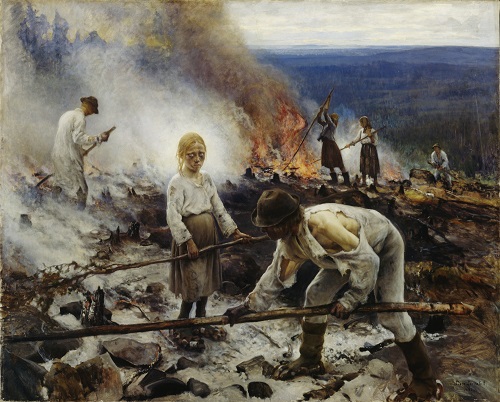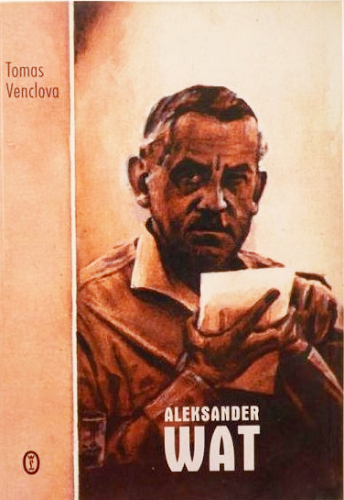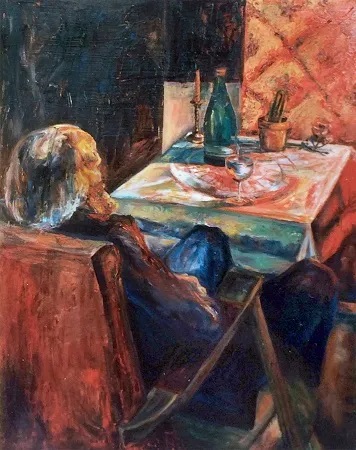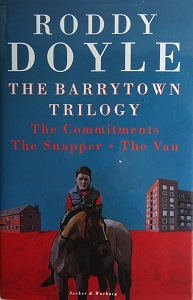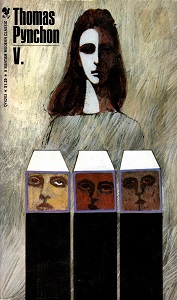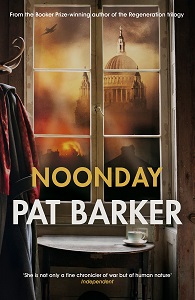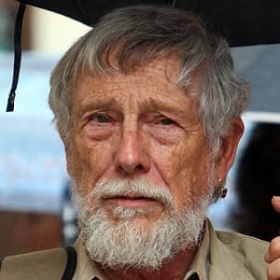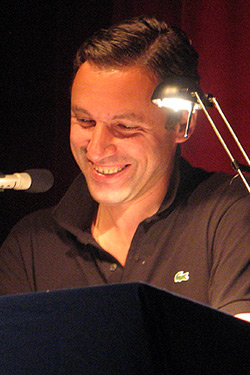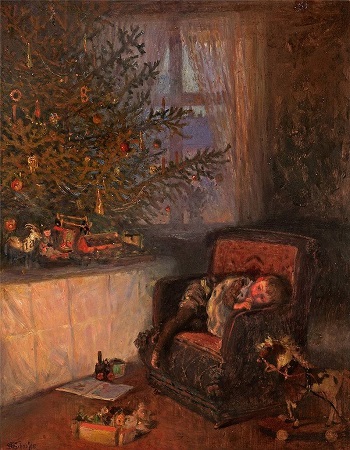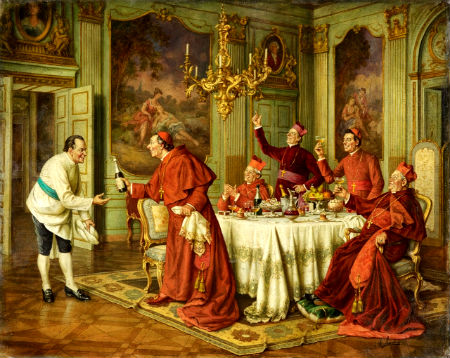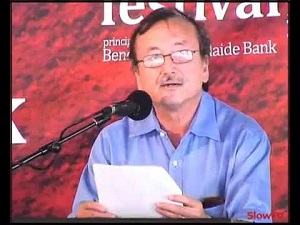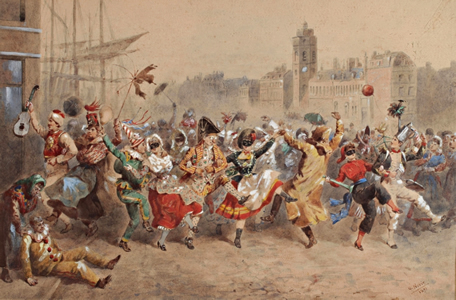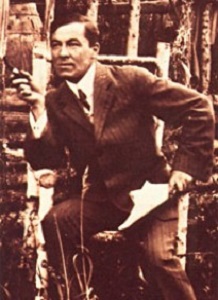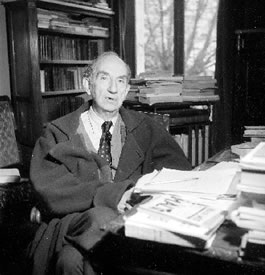De Deense dichteres, schrijfster en essayiste Inger Christensen werd geboren op 16 januari 1935 in de stad Vejle aan de oostkust van Jutland. Inger Christensen overleed op 2 januari jongstleden. Zie ook mijn blog van 16 januari 2008.
Up they soar
Up they soar, the planet’s butterflies,
pigments from the warm body of the earth,
cinnabar, ochre, phosphor yellow, gold
a swarm of basic elements aloft.
Is this flickering of wings only a shoal
of light particles, a quirk of perception?
Is it the dreamed summer hour of my childhood
shattered as by lightning lost in time?
No, this is the angel of light, who can paint
himself as dark mnemosyne Apollo,
as copper, hawkmoth, swallowtail.
I see them with my blurred understanding
as feathers in the coverlet of haze
in Brajcino Valley’s noon-hot air.
Uit: Alphabet (fragment)
7
given limits exist, streets, oblivion
and grass and gourds and goats and gorse,
eagerness exists, given limits
branches exist, wind lifting them exists,
and the lone drawing made by the branches
of the tree called an oak tree exists,
of the tree called an ash tree, a birch tree,
a cedar tree, the drawing repeated
in the gravel garden path; weeping
exists as well, fireweed and mugwort,
hostages, greylag geese, greylags and their young;
and guns exist, an enigmatic back yard;
overgrown, sere, gemmed just with red currants,
guns exist; in the midst of the lit-up
chemical ghetto guns exist
with their old-fashioned, peaceable precision
guns and wailing women, full as
greedy owls exist; the scene of the crime exists;
the scene of the crime, drowsy, normal, abstract,
bathed in a whitewashed, godforsaken light,
this poisonous, white, crumbling poem
Vertaald door Susanna Nied
Inger Christensen (16 januari 1935 – 2 januari 2009)
De Amerikaanse schrijfster en essayiste Susan Sontag werd geboren op 16 januari 1933 in New York. Zie ook mijn blog van 16 januari 2007 en ook mijn blog van 16 januari 2008.
Uit: In America
“ It felt like, an escapade; like leaving home; like telling lies — and she would tell many lies. She was beginning again; she was rejoining her destiny, which conferred on her the rich sensation that she had never gone astray.
Maryna arrived in the city in late June. Her skin had forgotten San Francisco’s brisk maritime climate, she had let slip from her mind the noble bay and ocean views, fog permitting, from the top of the steep streets in the heart of the insouciantly pla
nned city, but she recalled every detail of the wide, pillared entrance to the building below Nob Hill on which all her desires were trained.
Bogdan had arranged for Maryna to stay with old Captain Znaniecki and his wife. A respectable woman temporarily severed from her family would hardly want to live on her own. The Znanieckis had been chosen because they were kindly and protective, and because the Captain had married an American, so Maryna would not be speaking Polish all the time. Further, Znaniecki, a senior surveyor and title searcher with the Land Office, apparently knew everybody from members of the Bohemian Club to the governor of the state – and it would take concerted lobbying to secure an audition with the formidable Angus Barton, the California Theatre’s manager in charge of the stage. The morning after her arrival, Maryna had walked over to Bush Street and slipped into the theatre. Like a gladiator whom bravado and fear have lured to the last row of the empty stadium the day before the game, high above the arena’s neatly raked, un-bloodied sand, Maryna entered one of the boxes for a view of the red velvet curtain and the width of the peacefully darkened stage. But the stage was not dark: a rehearsal was under way. A tall, stooped man dressed in black had bounded from his seat in the tenth row and was rushing down the aisle: she wondered if he could be Barton. “Don’t tell me you’ll be ‘all right’ this evening,” he shouted at one of the actors. “If there’s anything I hate, it’s that. If you’re ever going to be ‘all right,’ you can be ‘all right’ now.” Yes, that must be Barton.

Susan Sontag (16 januari 1933 – 28 december 2004)
De Duitse schrijver Reinhard Jirgl werd op 16 januari 1953 in Oost-Berlijn geboren. Zie ook mijn blog van 16 januari 2007 en ook mijn blog van 16 januari 2008.
Uit: Hundsnächte
„Als diese Dörfler nicht abließen, sondern in ihrem Gefuchtel & Gebrüll eher noch sich steigerten – wollten sie uns ?warnen -, stellte ein Fahrer nach dem andern schließlich den Motor seines Fahrzeugs ab, stieg aus & ging langsam auf den wirren Haufen Leute zu, die, schien es, nichts anderes zu tun hatten, als in dieser 1öde aufgeregt durcheinander zu laufen, die Stille mit ihrem Geschrei zu vergiften & dazu mit Armen & Händen zu fuchteln wie ein riesiges auf den Rücken gefallenes Insekt. -:?Warnung, doch Warnung ?wovor: ?Was soll denn sein mit der Hand voll Ruinen, ehemaliger Stallungen Schuppen Wohnhäuser, viele schon Damals bei der Zwangsevakuierung dieser Ortschaft bis zur Unkenntlichkeit geschliffen, 1 Ort, wie es hieß, den sowohl der Dreißigjährige, der napoleonische Krieg wie auch die Rote Armee nur aus dem 1fachen Grund verschonten, weil all=die Armeen ihn, diesen Ort, eingesunken schon damals in Buschwerk & von Wald wie von großen Armen schützend umhegt, nicht gefunden hatten – , und erst mit dem Aufrücken von Heerscharen östlicher Bürokratie, die 2 Mal ihr Grenzgebiet Deutschland gegen Deutschland neu gezogen – Aktionen von Ungeziefer bis Kornblume -, hatten schließlich auch diesen Ort & besser als in acht Jahrhunderten jeder Söldnerhaufen, innerhalb von 8 Jahren zum Verschwinden gebracht; Ruinen, zu Ruinen verfallen -, Restegemäuer von einem vor Jahrzehnten evakuierten Dorf inmitten der 1öde, von Schlingpflanzen Baumwerk Weinranken & Büschen im Griff wie unter einer unendlich langsam sich schließenden Faust, Holunderblüten im Dunkel, fahle Nägel & Krallen an den Klauen pflanzlicher Wesen, die mit der unfassbaren Geduld aller Pflanzen auf das Verschwinden von Zeit lauern, Zeit, die sie, die Pflanzen, seit Anbeginn in Bann geschlagen hält, um dann im Augenblick des Lösens von dieser Fessel in 1 Explosion von Wachstum vorschnellend über die schäbigen Gemäuerreste u die gesamte Landschaft herzufallen, der Menschen u der übrigen Albträume sich bemächtigend, dies=Alles wie Knüllpapier von-sich schleudern würden, um an anderer Stelle, wo solcherart Leben dann hingeworfen wäre, Alles schon Getilgte, Weggeworfne & Zerstörte mit der den Pflanzen eigenen, chlorophyllhaften Geduld noch 1 Mal von-vorn beginne zu lassen – :?“

Reinhard Jirgl (Oost-Berlijn, 16 januari 1953)
De Australische schrijver en essayist Brian Castro werd geboren op 16 januari 1950 in Hongkong. Hij is van gemengde Portugese, Chinese en Engelse komaf. Van 1968 tot 1976 studeerde hij aan de universiteit van Sydney, waar hij in 1970 een prijs won in een verhalenwedstrijd. Castro werkte in Hongkong, Australië en Frankrijk als leraar en schreef enkele jaren voor Asiaweek. Hij debuteerde in 1982 met Birds of Passage.
Uit: Shanghai Dancing
„So my father looks out across the Whangpoo and the Soochow and it is already midday, 1932. He bathes in tepid water, rinsing and wincing at a pain in his genitals and donning his cream linen suit and knitted tie, repairs for brunch in the hotel restaurant. He plans his trip next season, on the President Line, to Vancouver, maybe the Great Lakes and home via Japan. Calls for the candlestick telephone and rings his friends. Waves for a car and he’s on his way to the Cercle Sportif where he meets Joao and Meme and Carlinho da Silva and two French girls and they play tennis and swim for an hour or so. Tiffin at three at the American Club and then a few rounds of ten-pin along polished alleys tingling with wax and the layered air of ripe cigars. Then a siesta in the Reading Room with the day’s paper upon his face, stuttered breath calibrating the hard canons of perfect billiard shots until the Boy wakes him at six for a shave, massage and then back to the Cathay to change for a tea-dance the Sassoons are holding; a casual slow-waltzing affair before cocktails out on dappled verandahs marking dates for future business. By nine it’s drinks on board his launch, jokes rippling across the water while they snack on crisp Peking duck folded into crepes, Meme tossing his Moet over the transom on account of his cirrhosis. But death, too, passes by ten when the cabarets are starting to jump. So onto the Ambassador, then the Canidrome, or perhaps the Venus Cafe and then by rickshaw convoy to back-street speak-easies, the high class, low class and no class at all, each boasting of hostesses at a dollar a dance for taxi-dancing. The wheedling voice of the Maitre’D: Take your choice; that wide-eyed one, Small-bird, her name, she pines for you. So he lavished upon her ten books of tickets. Early next morning, he rolls home to the Cathay smelling of perfume and women and orders from the lingerie shop a boxed set of silken underwear and a bouquet of roses to be sent up to the Avenue Joffre. Then it all begins again. Midday; the opera glasses; all this work. Shanghai-dancing.“

Brian Castro (Hongkong, 16 januari 1950)
De Braziliaanse schrijver, theaterproducent, talk show host, acteur, schilder en musicus Jô Soares werd geboren op 16 januari 1938 in Rio de Janeiro. Hij kreeg zijn opleiding in Zwitserland en in de VS en ging daarna terug naar Brazilië waar hij voor Rio TV ging werken. Van 1988 tot 1999 had hij een talkshow bij SBT. In 2000 nam hij zijn format (te vergelijken met David Letterman) mee naar Rede Globo. Zijn eerste roman O Xangô de Baker Street schreef hij in 1995. In 2000 werd hij verfilmd.
Uit: Twelve Fingers: Biography of an Anarchist
„Dimitri senses that the two are nervous. Parts of the conversation among the trio were later written down by Mohammed and extracted from his Notebook of a Muslim Anarchist, discovered in a drawer upon his death, in 1940, in the house where he worked as a gardener:
“So, where’ve you been keeping yourself?” asked Cubrilovic, sitting down beside him.
I noticed immediately that the youth was bothered by our presence. He was almost a boy. He couldn’t be any older than Vaso, who was seventeen.
“Oh, around,” he answered, changing the subject.
I felt a certain apprehension in him. I pulled up a chair and sat down directly opposite him. Vaso introduced me:
“This is Mohammed Mehmedbasic. Mohammed, I’d like you to meet my friend Dimitri Borja Korozec. We’re both students at the Gymnasium, and I can guarantee you he’s the clumsiest person in the
world,” said Cubrilovic, laughing nervously, without hiding his agitation over what was about to happen.
Every few minutes he would glance at the door and check his watch. He wouldn’t be able to keep the plan secret much longer. I tried to get him away from there, but it was too late. He told everything, looking Dimitri in the eye.“
José Soares (Rio de Janeiro, 16 januari 1938)
De Amerikaanse dichter Anthony Hecht werd geboren op 16 januari 1923 in New York. Hecht studeerde Engels maar moest zijn studie onderbreken toen hij in 1944 werd opgeroepen om te dienen in het leger. Een van zijn opdrachten was om in 1945, bij de bevrijding van het kamp Flossenbürg, gevangenen te interviewen. Deze opdracht heeft veel invloed gehad op zijn werk, mede doordat hij zelf joods was. Dichter Hecht debuteerde in 1954 met de bundel ‘A Summoning of Stones’. In de loop van zijn leven ontving hij vele prijzen waaronder de Pulitzer Prize voor poezie in 1968 voor zijn bundel ‘The Hard Hours’.
Curriculum Vitae
As though it were reluctant to be day,
…….Morning deploys a scale
…….Of rarities in gray,
And winter settles down in its chain-mail,
Victorious over legions of gold and red.
……The smokey souls of stones,
……Blunt pencillings of lead,
Pare down the world to glintless monotones
Of graveyard weather, vapors of a fen
…….We reckon through our pores.
…….Save for the garbage men,
Our children are the first ones out of doors.
Book-bagged and padded out, at mouth and nose
…….They manufacture ghosts,
…….George Washington’s and Poe’s,
Banquo’s, the Union and Confederate hosts’,
And are themselves the ghosts, file cabinet gray,
…….Of some departed us,
…….Signing our lives away
On ferned and parslied windows of a bus.
Saul And David
It was a villainous spirit, snub-nosed, foul
Of breath, thick-taloned and malevolent,
That squatted within him wheresoever he went
…….And possessed the soul of Saul.
There was no peace on pillow or on throne.
In dreams the toothless, dwarfed, and squinny-eyed
Started a joyful rumor that he had died
…….Unfriended and alone.
The doctors were confounded. In his distress, he
Put aside arrogant ways and condescended
To seek among the flocks where they were tended
…….By the youngest son of Jesse,
A shepherd boy, but goodly to look upon,
Unnoticed but God-favored, sturdy of limb
As Michelangelo later imagined him,
…….Comely even in his frown.
Shall a mere shepherd provide the cure of kings?
Heaven itself delights in ironies such
As this, in which a boy’s fingers would touch
…….Pythagorean strings
And by a modal artistry assemble
The very Sons of Morning, the ranked and choired
Heavens in sweet laudation of the Lord,
…….And make Saul cease to tremble.
Anthony Hecht (16 januari 1923 – 20 oktober 2004)
De Servische schrijver Aleksandar Tišma wer op 16 januari 1924 geboren in Vojvodina. Na zijn eindexamen in 1942 vestigde Aleksandar Tišma zich in Boedapest. Toen de Duitsers in 1944 Hongarije binnentrokken en begonnen met de uitroeiing van de joden werd Aleksandar Tišma opgepakt en te werk gesteld als dwangarbeider. Hij vluchtte aan het einde van de oorlog en sloot zich aan bij de verzetsbeweging van Tito. Na de Tweede Wereldoorlog studeerde Aleksandar Tišma Duits, Frans en Engels in Belgrado. Na zijn studietijd werkte hij bij een uitgever. In 1974 werd Tišma journalist. Hij woonde en werkte zijn hele verdere leven in Novi Sad. De enige uitzondering hierop was zijn verblijf in Parijs tijdens de burgeroorlog (1991-1995). Zijn eerste gedichtenbundel “De bewoonde wereld” verscheen in 1956. Vanaf de jaren zestig verschenen enkele verhalenbundels en romans. De vaste thema’s van hem waren de Tweede Wereldoorlog en de jodenvervolging.
Uit: Ohne einen Schrei (Vertaald door Barbara Antkowiak)
„Die Wirtin erwachte von einem ungewohnten, gedehnten Ton; als sie lauschte, brach er ab, dann zerriß er wieder die schläfrige Stille des morgendlich dämmerigen Zimmers. Sie wußte, daß ihr Mann bereits zur Arbeit gegangen war – sie erinnerte sich, ihn über die Waschschüssel gebeugt und später mit der Mütze auf dem Kopf an der Tür gesehen zu haben – und daß das Kind neben ihr lag, sie spürte sein Gewicht und seinen Atem. In der Wohnung war also niemand sonst; dennoch wollte dieser gedehnte Ton, der wie ein Wimmern klang, nicht verstummen. In der Sekunde, als ihr bewußt wurde
, daß es wirklich ein Wimmern war – vermutlich von einem Menschen -, war sie wach genug, um zu begreifen, daß es aus dem Mädchenzimmer kam, wo die Untermieterin wohnte.
Sie richtete sich im Bett auf, zog vorsichtig den Arm unter dem Kopf des Kleinen hervor, setzte die Füße auf den Boden und ging im Unterkleid, wie sie immer schlief – ohne in die Schuhe zu schlüpfen, die sie im Dunkeln nicht finden konnte -, auf Zehenspitzen zwischen Bett und Tisch hindurch zur Küche, in die das Licht des kalten Wintermorgens drang. Vor der Tür des Mädchenzimmers blieb sie stehen. Es war still gewesen, als sie über den kalten glatten Betonboden tapste, und für einen Moment hatte sie gedacht, das Geräusch zuvor sei ein Irrtum gewesen; nun machte sie zögernd an der Tür halt und hörte einen Schmerzenslaut, viel deutlicher als das schwer bestimmbare Wimmern, das sie im Zimmer vernommen hatte. Ohne Bedenken öffnete sie die Tür. Das Mädchenzimmer war hell wie die Küche, denn die Gardine war nicht zugezogen; die Wirtin erblickte mitten im Raum wie auf einer Bühne ihre Untermieterin Branka. Sie stand weit vorgebeugt, die Schuhe hatte sie von den Füßen gestreift, hielt die Knie gebeugt, der Kopf mit dem langen blonden Haar war kraftlos herabgesunken. Sie klammerte sich mit den Händen ans Bettgestell, als fürchte sie, jeden Augenblick zusammenzubrechen. Als die Tür knarrte, wandte sie erschrocken den Kopf und sah die Wirtin aus großen, grünen, weitstehenden Augen an; sie erkannte sie und begann zu weinen.

Aleksandar Tišma (16 januari 1924 – 16 februari 2003)
De Oostenrijkse schrijver Franz Tumler werd geboren op 16 januari 1912 in Gries bij Bozen. Tot 1938 werkte hij als leraar. Tot 1944 was hij met zijn tradionele manier van schrijven (hij werd vergeleken met Adelbert Stifter) een van de succesvolste schrijvers van zijn generatie. Na WO II richtte hij zich meer het autobiografische en psychologische vertellen. In nog latere teksten problematiseerde hij de mogelijkheden van het vertellen (“Aufschreibung aus Trient“, 1965). Vanaf 1950 tot aan zijn dood leefde hij in Berlijn.
Uit: Der Mantel
„Die Geschichte von dem Mantel, der ihm verlorengegangen ist, habe ich Herrn Huemer in unserer Gesellschaft ein paar Mal erzählen hören, und merkwürdigerweise hat sie uns jedesmal Eindruck gemacht, darüber war er selber erstaunt. Für ihn sei die Geschichte nurärgerlich gewesen, sagte er beim ersten Mal; ein reiner Verlust,wenn er ihn auch nicht so empfunden habe,weil etwas dabei ihn sorgloser, freier, großzügiger gemacht habe,was früher nicht seine Stärke gewesen sei. Wir alle
kannten Huemer ganz gut. Eine gewisse Kleinlichkeit und Ängstlichkeit gehörte zu seinen Eigenschaften. Offenbar wollte er sagen, daß er sie damals verloren habe, ähnlich wie de nMantel. Manchmal schien er uns mit seiner Erzählung bedeuten zu wollen, der Verlust des Mantels, und was damit zusammenhing, habe in ihm noch viel mehr bewirkt; es hörte sich an, als ziele er auf die
Behauptung, er habe sich damals geändert. Aber dann wieder, ein andermal, zog er aus der Erzählung entschieden das Gegenteil: niemand könne sich ändern, und das wisse er seither! Bei einem dritten Mal sagte er, die Sache wäre ihm als ein Zeichen begegnet. Jedesmal, wenn
er die Geschichte von dem Mantel erzählte, erwähnte er etwas dergleichen, worauf einmal einer der Zuhörer sagte: Aber Sie wollen doch nicht behaupten, daß dies einewahre Geschichte ist, das haben Sie doch nicht wirklich erlebt, so etwas erlebt man doch nicht! Huemer erwiderte: So geht es mir, ich erzähle alles getreu, aber die Leute sagen, es sei eine erfundene Geschichte. Einmal
sagte jemand: Das ist ja ein Traum, solche Dinge können einem in der Wirklichkeit nicht begegnen, die träumt man bloß!”
Franz Tumler (16 januari 1912 – 20 oktober 1998)
De Franstalige dichter en schrijver Jules Supervielle werd geboren op 16 januari 1884 in Montevideo, Uruguay, waar zijn Baskische ouders naartoe waren geëmigreerd. Zij stierven allebei door een opgelopen vergiftiging acht maanden na zijn geboorte. Een eerste bundel “Comme des voiliers” verscheen al in 1910, maar de eerste echt belangrijke bundel Débarcadères. publiceerde hij in 1922. Jules Supervielle correspondeerde o.a. met Rainer Maria Rilke en maakte ook kennis met de gebroeders Mann. Paul Celan heeft 36 van zijn gedichten vertaald. In Frankrijk werd hij goed ontvangen door schrijvers als von André Gide und Paul Valéry en Jacques Rivière.
Soyez bon pour le Poète
Soyez bon pour le Poète,
Le plus doux des animaux.
Nous prêtant son coeur, sa tête,
Incorporant tous nos maux,
Il se fait notre jumeau;
Au désert de l’épithète,
Il précède les prophètes
Sur son douloureux chameau;
Il fréquente très honnête,
La misère et ses tombeaux,
Donnant pour nous, bonne bête,
Son pauvre corps aux corbeaux;
Il traduit en langue nette
Nos infinitésimaux.
Ah! donnons-lui, pour sa fête,
La casquette d’interprète !
Nocturne en plein jour
Quand dorment les soleils sous nos humbles manteaux
Dans l’univers obscur qui forme notre corps,
Les nerfs qui voient en nous ce que nos yeux ignorent
Nous précèdent au fond de notre chair plus lente,
Ils peuplent nos lointains de leurs herbes luisantes
Arrachant à la chair de tremblantes aurores.
C’est le monde où l’espace est fait de notre sang.
Des oiseaux teints de rouge et toujours renaissants
Ont du mal à voler près du coeur qui les mène
Et ne peuvent s’en éloigner qu’en périssant
Car c’est en nous que sont les plus cruelles plaines
Où l’on périt de soif près de fausses fontaines.
Et nous allons ainsi, parmi les autres hommes,
Les uns parlant parfois à l’oreille des autres.
Jules Supervielle (16 januari 1884 – 17 mei 1960)
De Canadese dichter en schrijver Robert William Service werd geboren op 16 januari 1874 in Preston, Engeland. Zijn opleiding voltooide hij aan de universiteit van Glasgow. In 1897 emigreerde hij naar Canada en leefde hij enige tijd van gelegenheidsbaantjes in Whitehorse en in het Yukon territorium. In 1907 verscheen zijn beroemde ballade The Shooting of Dan McGrew. In dat jaar verscheen ook de bundel The Spell of the Yukon and Other Verses die in Engeland verscheen als The Songs of a Sourdough. Service werd niet alleen beroemd, maar ook rijk. Hij kwam te boek te staan als de Canades Kipling en kon zijn baan bij een bank binnen twee jaar opzeggen. De rest van zijn leven bracht hij door in Parijs, Zuid-Frankrijk en Monte Carlo.
The Men that Don’t Fit In
There’s a race of men that don’t fit in,
A race that can’t stay still;
So they break the hearts of kith and kin,
And they roam the world at will.
They range the field and they rove the flood,
And they climb the mountain’s crest;
Theirs is the curse of the gypsy blood,
And they don’t know how to rest.
If they just went straight they might go far,
They are strong and brave and true;
But they’re always tired of the things that are,
And they want the strange and new.
They say: “Could I find my proper groove,
What a deep mark I would make!”
So they chop and change, and each fresh move
Is only a fresh mistake.
And each forgets, as he strips and runs
With a brilliant, fitful pace,
It’s the steady, quiet, plodding ones
Who win in the lifelong race.
And each forgets that his youth has fled,
Forgets that his prime is past,
Till he stands one day, with a hope that’s dead,
In the glare of the truth at last.
He has failed, he has failed; he has missed his chance;
He has just done things by half.
Life’s been a jolly good joke on him,
And now is the time to laugh.
Ha, ha! He is one of the Legion Lost;
He was never meant to win;
He’s a rolling stone, and it’s bred in the bone;
He’s a man who won’t fit in.

Robert W. Service (16 januari 1874 – 11 september 1958)
De Hongaarse schrijver en journalist Kálmán Mikszáth werd op 16 januari 1847 in Szklabonya (tegenwoordig Slowakije) geboren in een familie van kleine grondbezitters. Tussen 1857 en 1863 bezocht hij het lagere gymnasium in Rimaszombat (tegenwoordig Slowakije), tussen 1863 en 1866 ging hij naar het lyceum in Selmecbánya (tegenwoordig Slowakije). Na zijn middelbare eindexamen studeerde hij een paar semesters rechten in Győr. Begin jaren 1870 legde hij zijn eed af en liep stage bij de hoofdrechter in Balassagyarmat. In 1869 begon hij te publiceren. In 1873-1874 werkte hij in Boedapest als journalist en redacteur, in 1874 verscheen zijn eerste bundel met de titel Elbeszélések. (De stoker). In 1875 en 1876 leefde hij onder zeer arme omstandigheden in Boedapest. Omdat ze zo arm waren, liet hij zich van zijn vrouw scheiden, maar na zijn eerste succes trouwden ze in 1882 weer. Vanaf augustus 1878 was hij tweeënhalf jaar lang journalist in Szeged. Deze tijd was een van de rijkste periodes van zijn leven. Hij was actief in het openbaar leven van de stad, hij verzamelde belevenissen, zijn horizon verruimde. In 1881 en 1882 verschenen twee novellenbundels van hem (A tót atyafiak, A jó palócok, Engels: The Slovak Relations, The Good People of Palóc ) en vrij snel werd zijn naam bekend in literaire kringen.
Uit: The most dreadful night of all
“A sea which was swelling so fast that in a split second an enormous mass of water flooded the town, arriving furtively like an assassin but so swiftly that it was there before anyone could have become aware of the danger. And it was coming from all sides at once, all of a sudden. And it was impossible to escape from it. And as one was observing the houses from above, looking out of the open window, as they were becoming smaller and smaller as if they were shrinking, there could no longer be any doubt about what was down below, it was the water. And the houses were not only shrinking, but also cricks and cracks could be heard here and there, time and again, they were not louder than a cracking sound set against a raging storm or when a nut is cracked, and after each crack a white house disappeared under the water for ever, a white house where earlier in the evening perhaps fair-haired children looked out of the windows smiling sweetly and happily… The bullying elements seemed to exchange significant glances laughing and enjoying how efficiently they can join their forces to provoke this unfortunate town. And not one of them wanted to rest idle and stay away from the work of devastation. They seemed to say defiantly: “Well, which of us is the stronger?”

Kálmán Mikszáth (16 januari 1847 – 28 mei 1910)
De Franse schrijver Louis de Rouvroy, hertog van Saint-Simon werd geboren op 16 januari 1675 in Versailles. Hij was een Frans hoveling en auteur van een omvangrijk autobiografisch werk, genaamd de Mémoires: een onovertroffen beschrijving van gebeurtenissen en personages tijdens de laatste regeringsjaren van de Zonnekoning. Saint-Simon begon met schrijven in 1694, toen Lodewijk XIV aan de macht was, en beschreef uitvoerig de periode tot 1723, toen de enige opvolger, Lodewijk XV, op dertienjarige leeftijd tot koning werd gekroond.
Uit: Mémoires de Saint-Simon
„Je portais le nom de vidame de Chartres, et je fus élevé avec un grand soin et une grande application. Ma mère, qui avait beaucoup de vertu et infiniment d’esprit de suite et de sens, se donna des soins continuels à me former le corps et l’esprit. Elle craignit pour moi le sort des jeunes gens qui se croient leur fortune faite et qui se trouvent leurs maîtres de bonne heure. Mon père, né en 1606, ne pouvait vivre assez pour me parer ce malheur, et ma mère me répétait sans cesse la nécessité pressante où se trouverait de valoir, quelque chose un jeune homme entrant seul dans le monde, de son chef, fils d’un favori de Louis XIII, dont tous les amis étaient morts ou ho
rs d’état de l’aider, et d’une mère qui, dès sa jeunesse, élevée chez la vieille duchesse d’Angoulême, sa parente, grand’mère maternelle du duc de Guise, et mariée à un vieillard, n’avait jamais vu que leurs vieux amis et amies, et n’avait pu s’en faire de son âge. Elle ajoutait le défaut de tous proches, oncles, tantes, cousins germains, qui me laissaient comme dans l’abandon à moi-même, et augmentait le besoin de savoir en faire un bon usage, sans secours et sans appui; ses deux frères obscurs, et l’aîné ruiné et plaideur de sa famille, et le seul frère de mon père sans enfants et son aîné de huit ans.“

Saint-Simon (16 januari 1675- 2 maart 1755)
De Nederlandse dichteres Nel Benschop werd geboren op 16 januari 1918 te Den Haag. Zie ook mijn blog van 16 januari 2007.
Pniel
Genesis 32:26
Er komt een tijd, dat ieder mens alleen
moet staan – en oog in oog met God;
Dan is geen enkle vriend meer om hem heen
en geen geliefde deelt zijn lot.
Er komt een tijd, dat God wat hij bezat
(gebeurt het vroeg? gebeurt het laat?)
hem afneemt als een waardeloze schat
die door de mot en roest vergaat.
Maar wie met God blijft worst’len als een man,
en Hem niet eerder heen laat gaan
dan nadat Hij hem zegent – laat hij dan
als kreup’le in het leven staan,
hij krijgt van God een nieuwe, witte naam;
zijn zwart verleden is voorbij.
Hij is nooit meer alleen, want met God saam
gaat hij zijn weg, verlost en vrij.
Nel Benschop (16 januari 1918 – 31 januari 2005)
